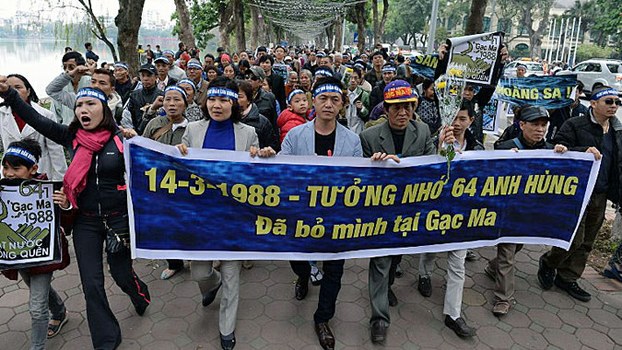




Relatives of Vietnamese soldiers and veterans of a fatal naval clash between Vietnam and China marked its 30th anniversary Tuesday by visiting the site of the incident near a disputed island chain in the South China Sea and holding a prayer ceremony to honor the dead.
On March 14, 1988, Vietnam sent two armed transport ships and a landing craft carrying around 100 People’s Army of Vietnam soldiers to Johnson South Reef, Collin Reef, and Lansdowne Reef in the contested Spratly Island chain with construction materials in a bid to secure its territorial claims.
Chinese frigates deployed members of the People’s Liberation Army to confront Vietnamese soldiers on Johnson South Reef in a bid to remove a Vietnamese flag planted there, sparking a skirmish between the forces on the ground.
The ships then exchanged fire and the heavily outgunned Vietnamese vessels were sunk, leaving 64 Vietnamese soldiers dead and 11 wounded. The Chinese forces, which suffered only one wounded casualty, arrested nine Vietnamese troops who were later freed.
Early on Tuesday, two high-speed ships carrying nearly 20 passengers departed Da Nang city, on Vietnam’s central coast, for waters near the disputed Paracel Islands to commemorate the Vietnamese soldiers killed in the 1988 confrontation—few of whose remains have been recovered.
China seized the Paracel Islands, which it still holds, in a skirmish with Vietnamese forces in 1974 that left 75 Vietnamese soldiers dead.
Relatives of the fallen soldiers and veterans of the clash also gathered at the Sailor’s Training Center on the Gulf of Da Nang to hold a prayer ceremony and lay wreaths of flowers in the water, including Nguyen Van Thong—one of the nine Vietnamese arrested by the Chinese Navy on the day of the incident.
Another event to commemorate the clash will be held by the Da Nang Committee of Spratlys Veterans on Wednesday.
Since the incident occurred, China has aggressively asserted its claims to the Spratlys and the rest of the South China Sea—which Vietnam refers to as the East Sea—based on its so-called “nine-dash” demarcation line that encompasses some 90 percent of the waters, including territory contested by Vietnam, the Philippines, Brunei, Malaysia, Indonesia, Thailand, and Singapore.
Beijing has been fortifying the islands it claims in the vital waterway with weaponry, runways and deep water berths. China has also created artificial islands in the South China Sea by dredging massive amounts of sand and Chinese officials have promoted tourism to the islands.
Countries, including Vietnam, claim that illegal fishing by Chinese vessels in their territorial waters is on the rise, prompting anti-China protests.
Tuong Lai, a prominent intellectual in Vietnam, recently told RFA’s Vietnamese Service that during a Feb. 27 media briefing, officials in Hanoi issued a directive that the commemoration of the Johnson South Reef clash “will be used to propagate the theme of heroism in fighting [against foreign invasion]” of the country’s territorial claims.
“We are waiting to see how [the authorities] proceed on March 14,” he added, suggesting the anniversary of the incident could be used by Vietnam’s government to drum up nationalist sentiment against China.
In 2016, an international arbitration court in the Hague, the Netherlands, ruled that China has no right to resources within its so-called nine-dash demarcation line, and that it is not entitled to an exclusive economic zone surrounding reefs and atolls in the Spratly Islands because these features did not qualify as islands generating such zones.
Vietnam continues to assert its sovereignty over the Spratly Islands, although China has dismissed the ruling and continues its military buildup in the South China Sea.
Vietnamese police routinely break up anti-China protests marking the anniversaries of the takeovers of the Spratly and Paracel islands and detain demonstrators.
Reported by RFA’s Vietnamese Service. Translated by An Nguyen. Written in English by Joshua Lipes.